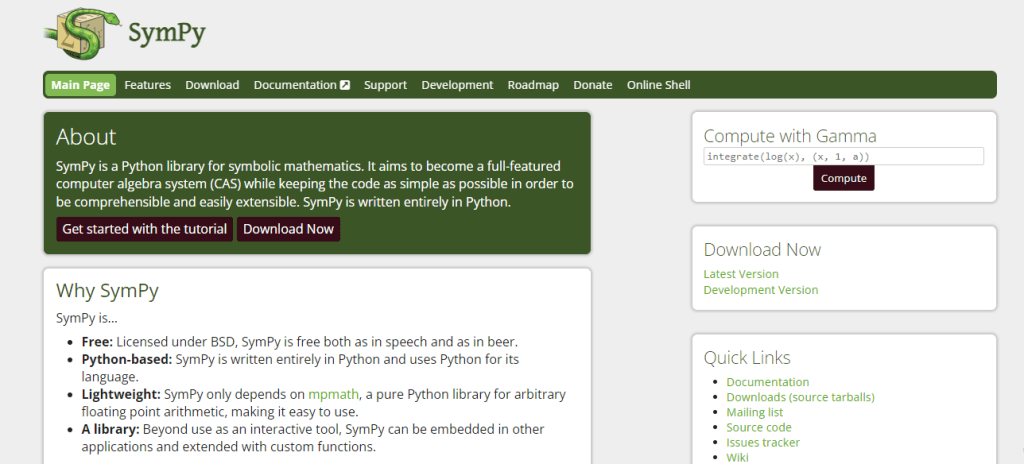SymPy is an open-source Python library for symbolic computation. It is designed to become a full-featured computer algebra system (CAS) while keeping the code simple and easily understandable. SymPy offers a robust platform for those who wish to perform mathematical computations in their software, from basic algebraic operations to calculus, discrete mathematics, physics, and beyond.
How Does It Work?
To start with SymPy is as straightforward as installing the library and importing it into your Python environment. Once imported, SymPy provides various functions and classes that allow users to create and manipulate mathematical expressions. For instance, you can define symbols and symbolic expressions, perform algebraic operations, differentiate and integrate functions, solve equations, work with matrices, and much more.
Key Features

In the realm of symbolic computation, this Python library emerges as a comprehensive tool, offering a plethora of unique features. Each capability can facilitate mathematical computations and make them more accessible to software developers and researchers.
- Symbolic Computation: The primary strength of this tool lies in its ability to handle symbolic computation. Unlike numerical computation libraries, it offers precision by avoiding rounding errors, making it ideal for exact mathematical manipulations.
- Expression Simplification: One of its key features includes simplifying complex mathematical expressions. This functionality aids in reducing equations to their simplest form, making them easier to understand and solve.
- Calculus Operations: The library allows users to compute derivatives, integrals, and limits with ease. These calculus operations are essential for a myriad of fields, from physics to engineering.
- Equation Solving: It provides robust methods to solve equations, further extending its utility in mathematical problem solving.
- Matrix Operations: Matrix manipulation is another significant feature, useful in various fields like quantum mechanics and computer graphics.
- Visualization: The tool offers visualization capabilities for expressions and functions, providing a graphical representation of mathematical concepts.
- Python Integration: Unlike many Computer Algebra Systems (CAS), this tool is written entirely in Python. This allows seamless integration with other Python libraries and making it a lightweight and easily accessible tool for symbolic computation.
- Custom Functions: Users can create custom function classes, allowing for a high degree of flexibility and personalization in handling mathematical operations.
- Polynomials: The library supports operations with polynomials, enabling users to perform tasks like division, gcd, etc.
- Geometry: It offers geometric calculations, including the ability to work with points, lines, rays, and circles, among others.
- Discrete Math: The tool supports combinatorics, providing functionalities for permutations, combinations, and more.
In summary, this Python library’s key features extend beyond basic symbolic computation, offering a wide range of functionalities that cater to various mathematical needs. Its integration with Python makes it an accessible and versatile tool for anyone involved in scientific computing.
Benefits to Users

SymPy is particularly beneficial to those working in scientific computing, education, and research. The ability to perform symbolic computation allows for precise mathematical manipulations without the rounding errors associated with numerical computation. Furthermore, as a Python library, SymPy can be used alongside other scientific computing tools in the Python ecosystem, making it a versatile tool for various applications.
Pros
- Open-source and free to use
- Written entirely in Python
- No external dependencies
- Wide range of features for symbolic computation
- Active community and ongoing development
Pricing and Value for Money
Being an open-source tool, SymPy is completely free to use. This makes it a highly valuable tool considering its extensive features for symbolic computation. The fact that it is written in Python and can be integrated with other Python libraries adds to its value. Thus, providing a comprehensive environment for scientific computing at no cost.
Conclusion and Recommendation
In conclusion, SymPy is a powerful tool for symbolic computation. Its wide range of features, ease of use, and the fact that it is free and open-source make it an excellent choice for anyone needing to perform mathematical computations in their software. While it may require some familiarity with Python and symbolic computation, its active community and extensive documentation provide ample support for new users. Therefore, it is for scientists, educators, researchers, and anyone interested in mathematics and scientific computing.